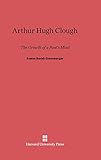Arthur Hugh Clough : The Growth of a Poet's Mind / Evelyn Barish Greenberger.
Material type: TextPublisher: Cambridge, MA : Harvard University Press, [2013]Copyright date: ©1970Edition: Reprint 2014Description: 1 online resource (270 p.)Content type:
TextPublisher: Cambridge, MA : Harvard University Press, [2013]Copyright date: ©1970Edition: Reprint 2014Description: 1 online resource (270 p.)Content type: - 9780674282407
- 9780674282414
- 821.8 23
- PR4458 .A784 1970eb
- online - DeGruyter
| Item type | Current library | Call number | URL | Status | Notes | Barcode | |
|---|---|---|---|---|---|---|---|
 eBook
eBook
|
Biblioteca "Angelicum" Pont. Univ. S.Tommaso d'Aquino Nuvola online | online - DeGruyter (Browse shelf(Opens below)) | Online access | Not for loan (Accesso limitato) | Accesso per gli utenti autorizzati / Access for authorized users | (dgr)9780674282414 |
Frontmatter -- Acknowledgments -- Contents -- Introduction -- CHAPTER I. The Higher One -- CHAPTER II. Citoyen Clough -- CHAPTER III. The Morals of Intellect -- CHAPTER IV. The World's Arena -- CHAPTER V. The Hopeful Country -- CHAPTER VI. The Battle by Night -- Appendices. Bibliography. Notes. Index -- APPENDIX A. Clough's Undergraduate English Essays -- APPENDIX Β. New Poetry and Prose -- Selected Bibliography -- Notes -- Index
restricted access online access with authorization star
http://purl.org/coar/access_right/c_16ec
Arthur Hugh Clough (1819-1861), poet, skeptic, friend of Emerson and of Matthew Arnold, was a man concerned with the religious, political, and social issues of the turbulent times in which he lived. In this fresh examination of Clough, Greenberger traces the intellectual development of a poet who was considered a brilliant failure in his own day, a reputation that still persists despite the fact that Clough is now attracting considerable critical attention. Her study contradicts this traditional view of him as ineffectual and uncommitted and reveals instead a complex figure whose varied interests enriched his prose and poetry. Greenberger has made a thorough study of all of Clough's prose on contemporary issues written between 1837 and 1853. These largely neglected writings, many of which remain unpublished, enable her to follow the poet's development through religious doubts and conflicts and to trace his political metamorphosis from naive idealism through radicalism to a final disenchantment with utopias. Having placed the poet's work in its proper historical context, the author goes on to reveal the great extent to which Clough succeeded in making the issues of his day viable subjects for poetry. Greenberger, thoroughly versed in the intellectual history of the Victorian period, vividly depicts the English social and economic scene and contemporary life at unreformed Oxford. She suggests new insights into Clough's relations with Emerson, the influence of Carlyle upon the poet, and his reactions to the America of the early 1850's. The author concludes that the techniques Clough developed for presenting his ideas in poetic form and the concerns that pervaded his thinking make him a precursor of twentieth-century literature. In the last chapter she relates her findings to Clough's three major poems. She includes in an appendix a number of new poems and other material by Clough found in manuscript during her research.
Mode of access: Internet via World Wide Web.
In English.
Description based on online resource; title from PDF title page (publisher's Web site, viewed 29. Nov 2021)


